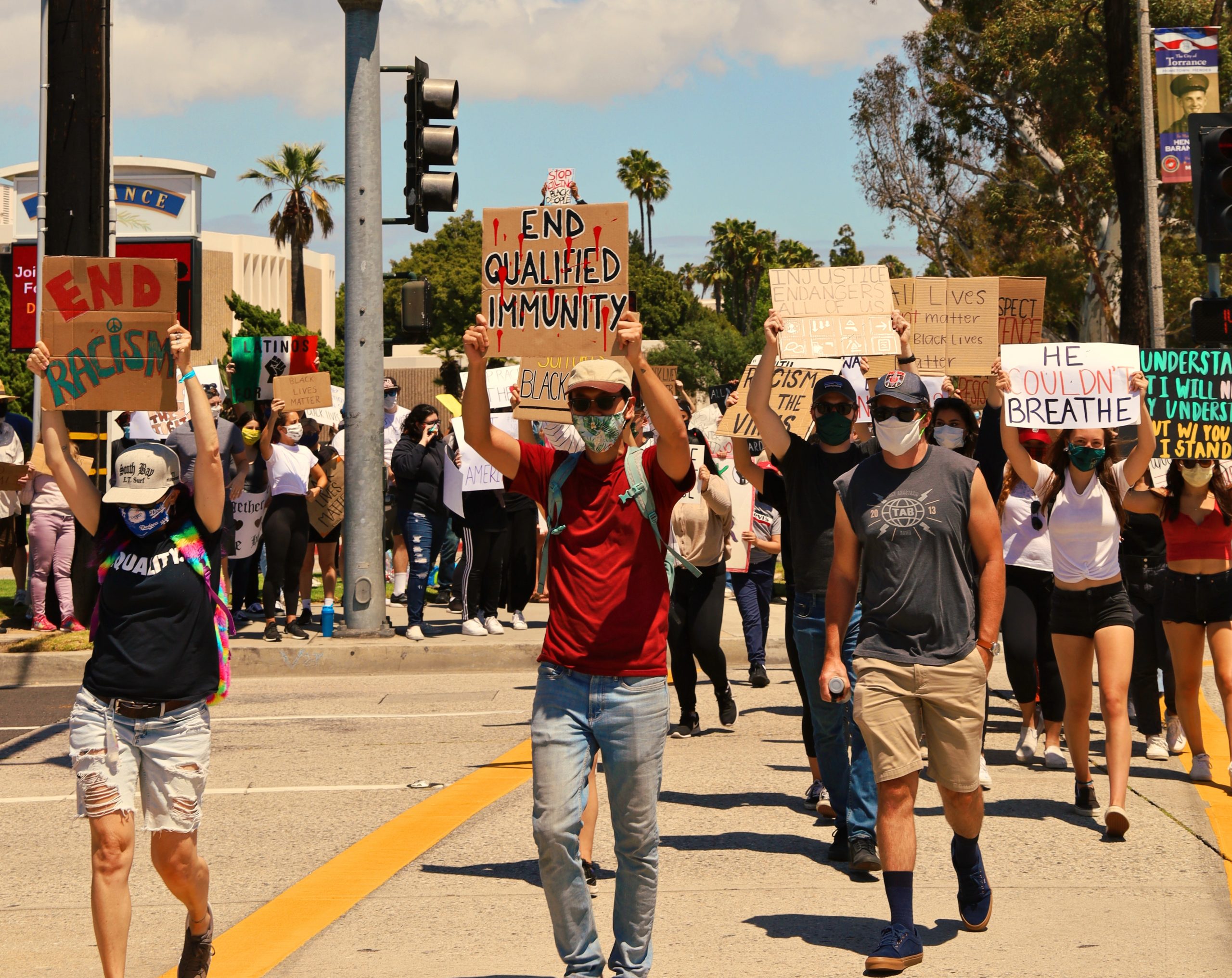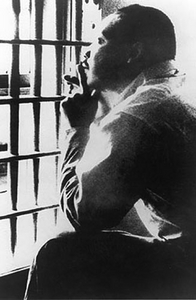
Qualified Immunity and Natural Law
Brandon Paradise
Photo by Eric Yeich from Pexels
In defense of his direct-action campaign and breaking of Jim Crow laws, Martin Luther King, Jr. cited Saint Thomas Aquinas’s proposition that “an unjust law is a human law that is not rooted in eternal and natural law.” In the same way that King and his fellow fighters in the black freedom struggle faced segregation statutes that violated natural law, in the judicial doctrine of qualified immunity, we today face a violation of natural law. Qualified immunity is a defense that government actors, including law enforcement, may assert against lawsuits alleging that they have violated a plaintiff’s civil rights. If granted, the defense forecloses trial, denying plaintiffs their day in court. By precluding civil actions against law enforcement for violations of civil rights, qualified immunity places police above the law, even where the conduct a plaintiff alleges is plainly immoral or results in an unlawful killing.
In the wake of George Floyd’s public murder by Minneapolis police officers, there has been a groundswell of support to end or dramatically reform qualified immunity. The movement to address qualified immunity has support from diverse quarters, including libertarian organizations, such as the Cato Institute and the Institute for Justice, Black Lives Matter activists, Democratic, Libertarian, and Republican lawmakers, as well as liberal Supreme Court Justice Sonia Sotomayor and conservative Justice Clarence Thomas. Despite this ideologically diverse support, and the fact that 66% of the American public believes that police should be subject to suit for excessive force claims, the movement to address qualified immunity has stalled. President Trump recently described ending qualified immunity as a “nonstarter” and Republican Senator Tim Scott called it a “poison pill” for GOP lawmakers seeking to address police brutality. In this brief essay, I argue that in the context of Fourth Amendment claims against law enforcement for unreasonable searches and seizures, our current doctrine of qualified immunity violates natural law and adherents of natural law ought to support efforts to address it.1 The argument I offer here is limited to claims against law enforcement for unreasonable searches and seizures in violation of the Fourth Amendment. I leave unexplored whether qualified immunity violates natural law in the context of other kinds of claims.
Natural Law: The Measure of Positive Law
In addition to human or positive law (i.e., the law that a particular society has promulgated), many philosophers, theologians, and jurists throughout the ages have insisted upon the existence of natural law. To simplify a complicated definitional issue, and setting aside secular theories of natural law, Christian natural law is the law of God known through practical reason as implanted by God in our rational nature or derived from reflection on human nature.2 Whether natural law is derived from reason or human nature is beyond the scope of this short piece and reflects a long running debate between traditional and new natural law theorists, with the former deriving it from human nature and the latter maintaining that natural law is apprehended by reason. As St. Paul characterizes it in Romans 2:15, natural law is often described as the law that is “written on the heart.”
Unlike positive law, natural law exists whether or not a particular community adopts it. Because it is implanted in human reason, written on the heart, or subject to discovery through reason reflecting on human nature, natural law can be known even where it is not promulgated. According to Aquinas, the first precept of natural law is that “good is to be done and pursued, and evil is to be avoided.” From this general principle, specific moral principles can be derived, such as it is wrong to torture an infant — an act that can be known to be wrong and is wrong even if positive law were to authorize or command it. Further, such a positive law would violate natural law and would be unjust.
Martin Luther King, Jr.’s, “Letter From Birmingham Jail” is a widely known and historically important application of natural law’s insistence on the distinction between the natural and the positive law and just versus unjust laws. There King writes:
A just law is a man-made code that squares with the moral law, or the law of God. An unjust law is a code that is out of harmony with the moral law. To put it in the terms of St. Thomas Aquinas, an unjust law is a human law that is not rooted in eternal and natural law. Any law that uplifts human personality is just. Any law that degrades human personality is unjust. All segregation statutes are unjust because segregation distorts the soul and damages the personality.
In other words, applying Aquinas’s principle that laws contrary to human good are unjust, King maintains that because segregation statutes degrade human personality, they are contrary to human good and are therefore unjust.
Qualified Immunity: Its Origins and Evolution From Qualified to Near Absolute Immunity
After the Civil War, during the Reconstruction era, the Klu Klux Klan reigned terror and violence upon recently emancipated black people. In response, Congress passed the 1871 Klu Klux Klan Act. Among the provisions of this Act was Section 1983, which still survives today, as currently codified at 42 USC § 1983. Section 1983 provides a cause of action for persons deprived of “rights, privileges, or immunities secured by the Constitution and laws” by persons acting “under color of any statute, ordinance, regulation, custom, or usage, of any State or Territory or the District of Columbia.”
Although the text of Section 1983 makes no reference to qualified immunity, nearly a century after the statute’s adoption, the Court held that the defense of qualified immunity is available to claims brought pursuant to Section 1983. In Pierson v. Ray (1967), black clergy attempting to exercise their constitutional right to enjoy an integrated bus terminal were arrested and then convicted in state court for provoking a white mob and thereby threatening to breach the peace by waiting at a “whites only” section of a bus terminal in Jackson, Mississippi. The black clergy filed a Section 1983 suit against the arresting police officers and the presiding judge for unconstitutional arrest and conviction, respectively. After upholding the lower court’s decision granting the judge immunity, the Court held “that the defense of good faith and probable cause” is available to police officers on claims brought pursuant to Section 1983. In so doing, nearly one hundred years after Section 1983’s promulgation, the Court found that the defense of qualified immunity is available to defend against Section 1983 claims.3 It is worth noting Professor William Baude’s influential argument that, “the qualified immunity doctrine is unlawful and inconsistent with conventional principles of statutory interpretation.”Although I find Baude’s argument persuasive, whether or not qualified immunity is justified as a matter of statutory interpretation, my claim here that our current doctrine violates natural law would remain true.
Since Pierson, the Court has revised the doctrine of qualified immunity to make it considerably more difficult for plaintiffs to vindicate their civil rights through claims brought under Section 1983. In Harlow v. Fitzgerald (1982), the Court abandoned the subjective, good faith standard articulated in Pierson in favor of an objective, “reasonableness” standard, under which “government officials performing discretionary functions generally are shielded from liability for civil damages insofar as their conduct does not violate clearly established statutory or constitutional rights of which a reasonable person would have known.” In Saucier v. Katz (2001), the Court further refined its qualified immunity jurisprudence, setting forth a two-step inquiry whereby courts ask: (1) whether a constitutional right was violated and (2) if so, was the constitutional right “clearly established.” Only a few years later, in Pearson v. Callahan (2009), the Court again refined the doctrine, taking the momentous (and plaintiff-unfriendly) step of eliminating the need to conduct the first prong of the Saucier analysis. After Pearson, courts do not need to determine whether a constitutional right would be violated on the facts that a plaintiff alleges. Courts can grant a defense of qualified immunity, and thereby dismiss a case, on the grounds that the alleged constitutional violation was not “clearly established” when the underlying conduct took place.
Qualified immunity places officers above the law even in cases involving plainly immoral conduct and in cases involving unlawful killings.
As Professor Joanna Schwartz has observed, “the Court has repeatedly made clear that a plaintiff seeking to show that an officer’s conduct was objectively unreasonable must find binding precedent or a consensus of cases so factually similar that every officer would know that their conduct was unlawful.” In practice, meeting this standard requires plaintiffs to identify a precedent with nearly identical facts. As Justice Sotomayor recently noted in dissent, requiring precedent with nearly identical facts has resulted in “transform[ing] the doctrine [of qualified immunity] into an absolute shield for law enforcement officers.” It has resulted in the absurd situation of retarding the development of the very precedent that plaintiffs need to show that their rights have been violated under “clearly established law.” In other words, requiring precedent with nearly identical facts means that cases with distinct facts are destined to fail the inquiry into whether alleged misconduct violates a constitutional right under “clearly established law.”
Defenders of the doctrine often argue that the loss of qualified immunity “would have a profoundly chilling effect on police officers and limit their ability and willingness to respond to critical incidents without hesitation.” However, as scholars have pointed out, this claim is not true. First, Fourth Amendment jurisprudence governing excessive force claims already protects police against liability, if they have acted reasonably in circumstances that require “split-second decisions.” As a result, the doctrine of qualified immunity is unnecessary to protect police officers who engage in reasonable conduct. Indeed, as Professors Schwartz and Stoughton have written, it is when officers have acted unreasonably that qualified immunity shields them from liability unless the alleged conduct is unlawful under a prior precedent with virtually identical facts. Second, cities or counties almost always indemnify police officers, so officers rarely face personal liability. Even in the absence of qualified immunity, the practice of indemnification is likely to continue. Therefore, ending qualified immunity is unlikely to significantly increase personal liability exposure for law enforcement.
Qualified Immunity and Natural Law
According to Aquinas, “law must be essentially reasonable to be law.” To grasp the meaning of this principle, it is helpful to understand that for Aquinas reason is not merely a regulative, external principle that guides action. Instead, reason is implanted in human beings and teleologically directed to the good, with the “reasonable” being identified with the “good” and the “unreasonable” with the “bad.” Because the “reasonable” is identified with the good, and law must be “essentially reasonable,” according to Aquinas, “the end of the law is the common good.” Laws that are contrary to the common good are unjust and are, therefore, not law.
In the context of Fourth Amendment claims against law enforcement, the doctrine of qualified immunity violates Aquinas’s requirement that law be essentially reasonable, defined as directed to serving the common good.4 My implicit claim here is that conduct that is unreasonable under the Court’s Fourth Amendment reasonableness jurisprudence is unreasonable under Aquinas’s teleological conception of reasonableness. As discussed above, the Fourth Amendment already protects “reasonable” police conduct. Therefore, qualified immunity is not necessary to protect and incentivize reasonable policing. In protecting police from liability unless their conduct violates “clearly established law” (a showing which requires plaintiffs to identify virtually identical precedent), qualified immunity shields police from liability for unreasonable conduct, thereby protecting unreasonable policing. The doctrine thereby sanctions gross violations of morality and the common good. Because qualified immunity is contrary to the common good, the doctrine is unjust and, therefore, not law at all. I now describe a handful of cases that concretely illustrate how qualified immunity shields unreasonable conduct in violation of the common good.
In Jessop v. City of Fresno, the 9th Circuit granted qualified immunity in a Section 1983 suit alleging that police officers stole $225,000 in cash and rare coins. Because a prior precedent had not clearly established that “theft of property seized pursuant to a warrant violates the Fourth Amendment,” the court concluded that “[a]lthough the City Officers ought to have recognized that the alleged theft of [plaintiffs’] money and rare coins was morally wrong, they did not have clear notice that it violated the Fourth Amendment . . . .” In other words, according to the doctrine of qualified immunity, because the officers lacked notice that theft of $225,000 in cash and rare coins violated the positive law, they are entitled to qualified immunity and insulated from liability even though their conduct was morally wrong and, therefore, in violation of natural law.
In West v. City of Caldwell, a SWAT team bombarded a home with tear gas, destroying all of the possessions inside and rendering the home uninhabitable for two months, even though the suspect was not inside the dwelling. The homeowner, who was the suspect’s ex-girlfriend, filed a Section 1983 suit alleging, among other things, that the SWAT team’s use of tear gas exceeded the scope of her consent to search her home for the suspect. In granting the defendants qualified immunity, the 9th Circuit did not dispute the dissent’s view that the “Plaintiff’s Fourth Amendment rights [were violated] because no reasonable person would have understood Plaintiff’s consent to encompass shooting tear gas canisters into the house.” However, writing that “[t]he dissent never comes to grips with th[e] [correct] legal standard,” the court insisted on “address[ing] only whether clearly established law, defined at an appropriate level of specificity, ‘placed the constitutionality of the officer’s conduct ‘beyond debate.’ Wesby, 138 S. Ct. at 589 (quoting al-Kidd, 563 U.S. at 741, 131 S.Ct. 2074 ).” In other words, because sufficiently similar precedent did not clearly establish that the officers’ conduct violated the plaintiffs’ rights, the officers were granted qualified immunity, notwithstanding the fact that they unreasonably wrecked the plaintiff’s home, thereby violating practical reason and therefore natural law.
Many additional examples of courts granting qualified immunity for horrendous conduct can be found. Such cases include Corbitt v. Vickers, where the 11th Circuit granted qualified immunity to a deputy sheriff who shot a ten-year-old in the leg in the course of repeatedly trying to shoot a nonthreatening pet dog, and Kelsay v. Enrst, where the 8th Circuit granted qualified immunity where a police officer slammed a small woman into the ground, rendering her unconscious and breaking her collarbone because she did not comply with his order to “get back here.” As importantly, courts have granted qualified immunity in multiple cases like George Floyd’s, where incapacitated victims were killed as a result of police officers kneeling on them to the point of death.
In sum, qualified immunity places officers above the law even in cases involving plainly immoral conduct and in cases involving unlawful killings. As discussed above, the doctrine is unreasonable because it is unnecessary and, in fact, only protects police from liability where they have acted unreasonably. For these reasons, the doctrine of qualified immunity violates natural law.
Ending Qualified Immunity: The Right and Just Thing to Do
In the wake of the unlawful killings of George Floyd, Breonna Taylor, Rayshard Brooks and many other victims of law enforcement, a disproportionate number of whom have been black, millions of people are demanding that our nation’s leaders meaningfully address police brutality. Ending qualified immunity for claims against law enforcement would be an important step in that direction. It is also the right thing to do. As I have argued in this piece, the current, judicially created doctrine of qualified immunity violates natural law. As such, adherents of natural law should support efforts to end it. ♦

Brandon Paradise is an Associate Professor, Rutgers Law School and a McDonald Distinguished Fellow, Emory Center for the Study of Law and Religion. He holds degrees from Yale Law School, Union Theological Seminary and the University of Southern California.
Recommended Citation
Paradise, Brandon. “Qualified Immunity and Natural Law.” Canopy Forum, August 19, 2020. https://canopyforum.org/2020/08/17/qualified-immunity-and-natural-law/



